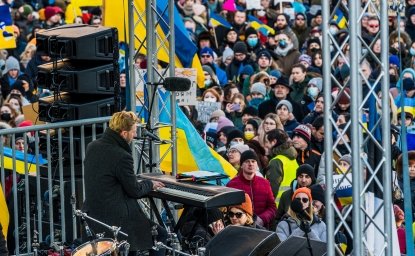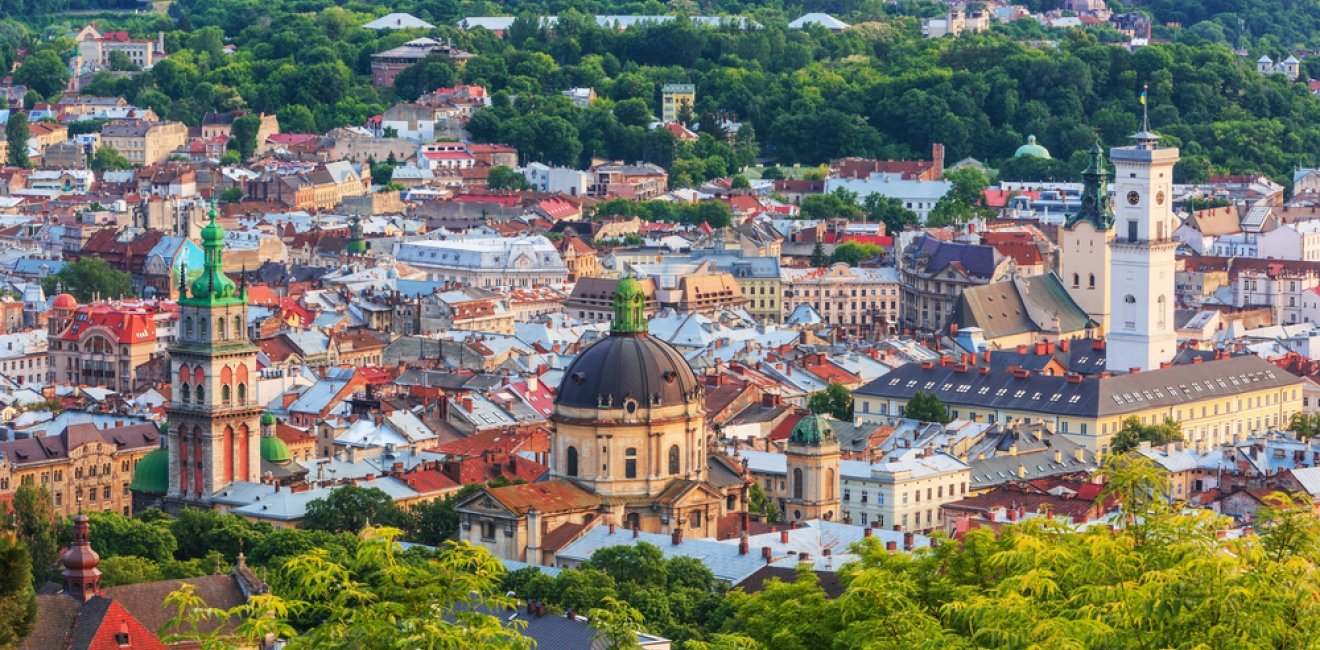
A blog of the Kennan Institute
BY BLAIR A. RUBLE
Austrian superstar organist Lukas Hasler’s June concerts at the Lviv Organ Hall marked one of the first appearances by an internationally acclaimed artist in Ukraine since the Russian invasion earlier this year. Hasler, a charismatic wunderkind sought after by organ performance venues around the world, honored a long-standing invitation to perform in Lviv. After delays due to the COVID epidemic and war, he decided now was the time to show support for Ukraine by performing in the country, offering works by Bach, Beethoven, Mendelssohn, and, most significantly, Mozart. The revival of live concerts in the relative safety of Lviv made his performances possible.
Hasler was drawn to Lviv by the opportunity to play the Organ Hall’s massive Rieger-Kloss organ. Located within the seventeenth-century former Church of St. Mary Magdaline, the hall opened its doors to concertgoers in 1988 after having served as a sports venue and dance hall during the Soviet period.
In his performances, Hasler also sought to honor the Mozart family’s connection with Lviv.
Wolfgang Amadeus and Constanze’s youngest child, Franz Xaver Wolfgang Mozart, was born in Vienna less than half a year after his father’s death. Trained by such Viennese musical luminaries as Antonio Salieri, Johan Nepomuk Hummel, Johann Georg Albrechtsberger, and Sigismund von Neukomm, Franz Xaver grew up to become a professional musician. Lacking his father’s famous braggadocio, the younger Mozart excelled as a teacher and enjoyed success as a composer. Less popular as a performer, he was drawn to the country estates surrounding Lemberg (as Lviv was then named) to teach before moving into town in 1813.
Franz Xaver spent the next quarter century in Lemberg before returning to Vienna and, eventually, Salzburg, where he became the Kapellmeister of that city’s Mozarteum. He died in 1844, having spent most of his adult life in Lemberg.
Franz Xaver’s tenure in the city was marked by considerable achievement. He conducted the amateur choir of Saint Cecilia, which grew into the city’s first music school. Long promoting his father’s legacy, he conducted the elder Mozart’s Requiem in a legendary 1826 concert at the Ukrainian Greek Catholic Cathedral of St. George. His Lemberg interlude has been well known and acknowledged by Mozart specialists and musicologists. The city commemorated his time in Lviv with a statue in Yevhena Malanyuka Square, unveiled in 2021.
Lviv’s tumultuous history is evident in how its name, Lion City, has appeared in the languages of multiple empires and communities that have claimed it as home, including Lemberg (German), Lwiwhorod (Ruthenian), Lwów (Polish), לעמבערג (Lemberg, Yiddish), Львов (L'vov; Russian), and Leopolis (Latin). Throughout the twentieth century, the city experienced numerous revolts and revolutions, brutal wars, fierce street fighting, and the extinction and forced expulsion of once vibrant Jewish, Polish, and Armenian communities.
Lviv stands at the center of Europe’s twentieth-century heart of darkness. Before World War II, when the city was incorporated into Poland, Poles made up over half of the city’s population. The historic Jewish community, dating from the tenth century, embraced some 140,000 members, which grew by another 100,000 Jews during the brief Soviet occupation between 1939 and 1941. By the end of the war, only a few thousand had survived the Holocaust.
The story of Franz Xaver Mozart represents a tiny tile in this broad—and troubling—intercultural mosaic. His time in the city constitutes part of a rich cultural subsoil that powerfully contradicts the single homogeneous storylines imposed by empires and imperial wannabes onto Lviv’s—and Ukraine’s—history. The lands that constitute today’s Ukraine have always been a heady mix of peoples, languages, religions, and cultures. They always have been more than the extension of any single neighboring power.
By performing in Lviv during the war, and by honoring the city’s musical heritage, which includes the Mozart family, Lukas Hasler has pointed toward a vibrant cultural future for the city, one that draws sustenance from multiple strains. Known for his dazzling finger work that effortlessly negotiates the most complex scores and thickly textured compositions, Hasler in his June concerts has brought lessons beyond music to a city that is redefining itself in a time of war.
The opinions expressed in this article are those solely of the author and do not reflect the views of the Kennan Institute.
Author

Former Wilson Center Vice President for Programs (2014-2017); Director of the Comparative Urban Studies Program/Urban Sustainability Laboratory (1992-2017); Director of the Kennan Institute for Advanced Russian Studies (1989-2012) and Director of the Program on Global Sustainability and Resilience (2012-2014)

Kennan Institute
After more than 50 years as a vital part of the Wilson Center legacy, the Kennan Institute has become an independent think tank. You can find the current website for the Kennan Institute at kennaninstitute.org. Please look for future announcements about partnership activities between the Wilson Center and the Kennan Institute at Wilson Center Press Room. The Kennan Institute is the premier US center for advanced research on Eurasia and the oldest and largest regional program at the Woodrow Wilson International Center for Scholars. The Kennan Institute is committed to improving American understanding of Russia, Ukraine, Central Asia, the South Caucasus, and the surrounding region through research and exchange. Read more

Explore More in Focus Ukraine
Browse Focus Ukraine
The Arts of War: Ukrainian Artists Confront Russia

Talking to the Dead to Heal the Living

Ukrainian Issue in Polish Elections

